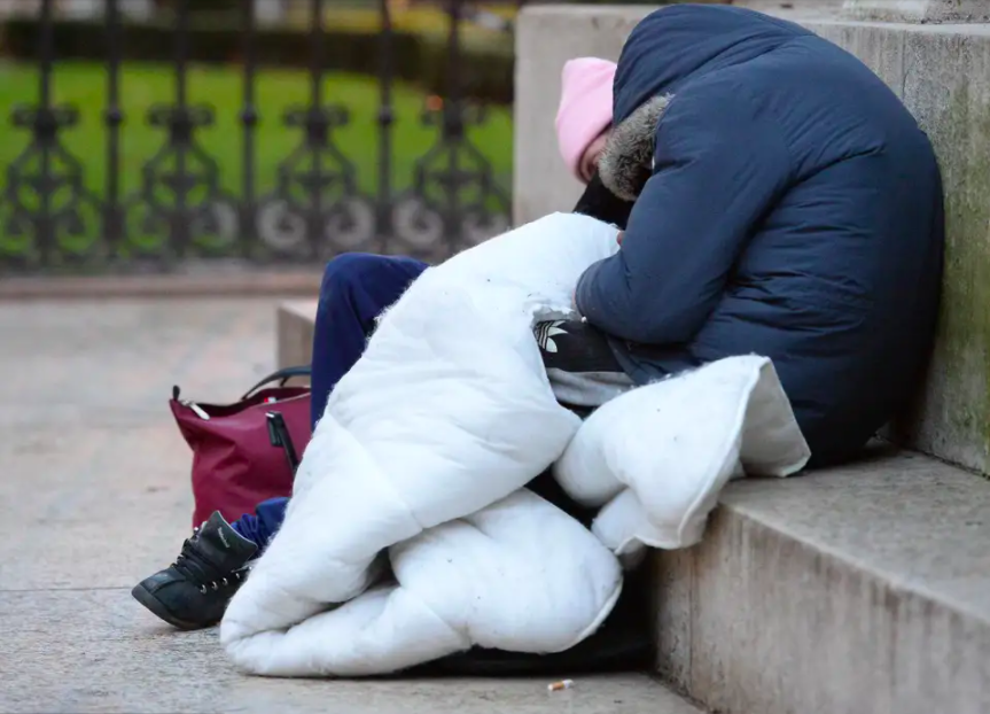‘Not a single minute of peace’: The increasing numbers of pregnant migrant women being made homeless
‘I am scared because he said we would become very famous because he would make a video of him killing me and the baby,’ one woman tells Maya Oppenheim


“I was cooking dinner,” Ana* tells The Independent. “He said to me: ‘You are not going to get out of this house alive because I’m going to kill you’. He was videoing me saying: ‘I’m going to do a live video recording of me killing you’. He put a knife by my neck.”
Ana, who came to the UK from Latin America, reported her partner to the police after a sustained campaign of abuse and, fearing the repercussions if she stayed in their flat, was left with nowhere to live – despite being four months pregnant.
Sadly Ana is not alone. Frontline service providers tell The Independent there is a growing problem of pregnant migrant women being forced onto the streets or sofa surfing during the pandemic.
Ros Bragg, director of Maternity Action, a leading pregnancy charity that runs an advice line for women, estimates there are thousands of pregnant migrant women currently homeless and either sleeping rough or moving from couch to couch in Britain, but a lack of data makes it difficult to understand the true scale of the problem.
Ana, who is due to have her abusive partner’s baby in the next few weeks, endured a vicious campaign of physical and psychological abuse from her ex in their on and off three-year relationship.
She arrived in the UK to join her partner but upon arriving she learnt he was actually married. Their relationship was coloured by dark, disturbing abuse which involved her ex-partner making threats to kill her and threatening to get her deported, telling her he would kill her once she was back in her home country and he could escape the UK justice system.
It was after the aforementioned incident, where her abusive ex-partner placed a knife to her neck and threatened to film himself killing her, that Ana finally called the police.
“He was recording me,” Ana recalls. “He broke a drawer in the kitchen. He went to get another beer, so I text my friend who contacted the police. The police arrived. The police stayed with him in the bedroom while another police officer stayed with me in the kitchen. Then they took him into custody.”
Despite his arrest, Ana felt too petrified to remain there. While she was fortunately put in temporary accommodation by the council, this only lasted for a month and she was quickly declared homeless.
“I was very scared,” Ana, whose ex was known to the police before the incident, explains. “I was very scared of having to sleep on the streets and not having any place to go. I was scared for my life and for my baby’s life. And now I am about to deliver I am even more scared for my baby’s life. I am scared because he said we would become very famous because he would make a video of him killing me and the baby.”
She says she had nobody to turn to after her ex-partner isolated her from support networks – as is routine in so many cases of domestic abuse. Thankfully, the Latin American Women’s Rights Service were able to get her a place to sleep in temporary accommodation run by a charity for vulnerable people who do not have access to public funds.
Ana, whose ex is not allowed to contact her due to his bail conditions, says if it was not for the organisation, she would have been pregnant and sleeping rough on the streets.
“How is it possible to be homeless and pregnant on the streets?” she asks. “I know two women who, if it wasn’t for Latin American Women’s Rights Service, would have been homeless and pregnant on the streets. I still have nightmares about my ex. I wake up in the middle of the night very frightened. I don’t leave the house anymore. I just go out to doctor’s appointments.”
Gisela Valle, director of Latin American Women’s Rights Service, warned the issue of pregnant migrant women being made homeless is a long-standing one but the problem has been exacerbated during the pandemic.
“Because statutory services and local services collapsed in lockdown, it is very difficult to get in contact with them,” she explains. “Women are living on the streets or sofa surfing. It is clear there is a collapse in services.”
How is it possible to be homeless and pregnant on the streets?
Ms Valle, whose organisation helps migrant women, says many who have endured domestic abuse end up homeless because they are unable to go into a refuge due to not having access to public funds.
“Migration status trumps everything else including for women who are pregnant or with a child,” she adds. “We are seeing increasing numbers of pregnant migrant women who have survived domestic abuse facing homelessness.”
She notes that when women have a child authorities are legally obliged to house the children but some local authorities will attempt to house only the children without delivering accommodation for the mother.
“Authorities also house the children with perpetrators,” Ms Valle adds. “Why would you leave children with perpetrators just because you don’t want to house the mothers?”
Natasha Waller, founder of Women for Refugee Women, argues that while there is a growing problem of homeless pregnant migrant women, there are not so many that it is an “insurmountable problem” for the government to tackle or an issue that would be “dauntingly expensive or complicated” to solve.
“There won’t be exact figures for these women,” Ms Waller adds. “Some of the lack of knowledge and lack of data is deliberate on behalf of the authorities, the home secretary, and social services. They don’t want to see them. Charities are stepping up in a piecemeal way providing support for these women but really this needs to be put on a statutory footing.”
Alexa*, another migrant domestic abuse victim, also faced homelessness while she was pregnant. She came to the UK after escaping gender-based violence in Latin America.
She embarked on a relationship with her partner, who holds a permanent residence in the UK, back in 2018. Her ex agreed to sponsor her application to remain in the UK before later refusing and using his leverage over her immigration status to control her.
We regularly talk to migrant women who are seeking advice on charging for NHS maternity care. All too often these women are destitute [and] struggling to sort out housing
But last year, his violence against her escalated after she became pregnant, and he began threatening to get her deported, which resulted in her being too fearful to report his abuse to the police.
“I felt I was discriminated against,” Alexa says. “When I was 16 weeks pregnant, social services came to visit me in the place where I lived with him. The social worker asked him: ‘Where do you sleep?’ And he said: ‘In bed’. And then she asked him where I was sleeping and he said: ‘On the floor’. She checked the refrigerator and saw that there was no food for me there. He also told her that he wasn’t going to get food for me.
“After he left for his country in Latin America, my bags were placed on the street, in front of my house,” Alexa adds. “I felt unwell and went to the hospital for help. When I got there the midwife defended me, she was infuriated with my situation. She took the social worker’s badge and said: ‘Who are you? If you are not taking her to safety, it is best that you leave her here’. It was only then that the social services offered me emergency accommodation.”
Alexa, who like Ana was housed in a temporary shelter by the Latin American Women’s Rights Service, said the entirety of her pregnancy was “terrifying” and she did “not have a single minute of peace”.
Ms Bragg notes many migrant women have underlying health conditions, which place them at risk of serious health problems while pregnant or in the postnatal period, so it is even more critical for them to have access to safe and secure housing.
She adds: “This is an issue which has become worse in the pandemic. Many migrant women have relied on friends and family to house them and restrictions imposed [during the] pandemic made this more difficult. Financial pressures during the recession have [also] made it harder for families to offer help to others.
“Through our advice lines, we regularly talk to migrant women who are seeking advice on NHS maternity care charges. All too often these women are destitute struggling to sort out housing and basic income. Some will be on the streets.”
The midwife defended me, she was infuriated with my situation
Stress during pregnancy for migrants can be compounded by rules specifying overseas women from outside the European Union who are expecting a baby must be charged for NHS care – with debt from maternity care affecting future immigration applications.
Charges start at around £7,000 but potentially double if there are complications with the pregnancy. The deaths of three pregnant women were directly linked to the Conservative government’s charging system in a major report that came out in December 2019. The women died after delays in seeking help because they wrongly thought they would have to pay for care.
Jo Underwood, a solicitor at leading housing charity Shelter, said they were all too aware of the issue of pregnant migrant women being left homeless. She could think of a few cases she had dealt with – recalling one where a pregnant rape victim who was trafficked into the UK wound up sleeping rough and having to sleep in a park for several nights.
“It must add so many layers of stress onto pregnancy which can already be an uncertain time,” she adds. “There is also the longer-term element of wanting to know you have got a safe home for your baby.”
A government spokesperson said anyone who has endured domestic abuse “must be treated as a victim first and foremost” regardless of their “immigration status”.
The representative added: “The £1.5m support for migrant victims scheme will deliver specialist support to migrant victims, with the aim of building a solid evidence base for the help they need.
“The new domestic abuse act will bolster our response to domestic abuse on every level to protect victims and ensure that perpetrators feel the full force of the law.
“We’re providing over £750m this year alone to tackle homelessness and rough sleeping – and we have so far housed 37,000 people during the pandemic through our ongoing Everyone In initiative. We expect councils to continue ensuring all rough sleepers are safely supported.”
*Names changed to protect identity and safety


Join our commenting forum
Join thought-provoking conversations, follow other Independent readers and see their replies
Comments